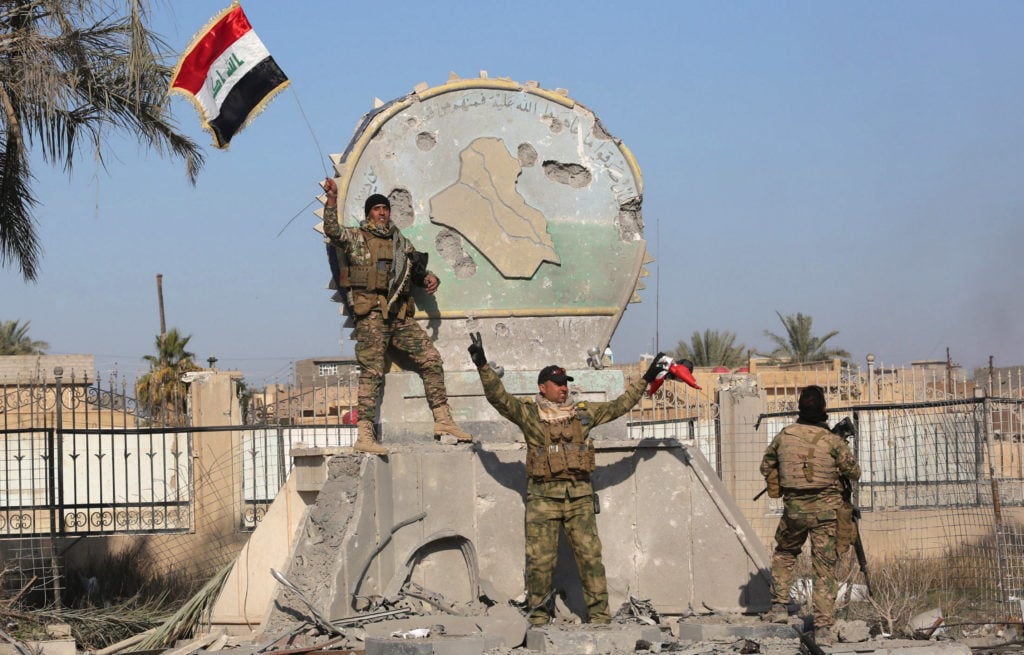
A member of the Iraqi security forces holds an Iraqi flag at a government complex in the city of Ramadi, December 28, 2015. (REUTERS/Stringer)
On March 22, terror struck Brussels with a twin blast at Zaventem Airport and the Maelbeek metro station, claiming the lives of 32 people and injuring over 300. The attacks claimed by ISIS came only a few days after a suicide bombing killed five and injured 36 in Istanbul—the fourth suicide bombing in Turkey in 2016.
The latest bombings have reheated the debate within the EU about tighter border controls—possibly foreshadowing the eventual breakdown of the Schengen Agreement. In addition, the attacks have hardened Europe’s determination to combat terrorism at home, with increased monitoring of ISIS fighters returning from the Middle East and improved intelligence sharing between EU members, and abroad, whether through ramping up aircraft deployments in the coalition against the Islamic State or by supplying weapons to local actors.
Experts have argued that ISIS’s increased activity abroad is a sign of weakness rather than strength. As the so-called caliphate begins to crumble—ISIS is thought to have lost around 20% of its territory in Syria and over 40% in Iraq since its peak expansion in August 2014—the group is allocating efforts and resources toward large-scale terrorist attacks abroad in order to influence the strategic calculations of the coalition member countries at a reduced cost.
Since ISIS’s “winner’s message” of “remaining and expanding” sounds increasingly hollow, this tactical shift is one way to catch global headlines and retain its legitimacy and ability to recruit.
Although the increased operational tempo of terrorist attacks is the manifestation of the group’s faltering, the ISIS underlying ideology is not expected to wither away anytime soon. Jonathan Schanzer, a former terrorism finance analyst at the Treasury Department, argues that “defeating the formal military presence of a terrorist group will not significantly mitigate the threat of lone wolf or small independent cells that are based in the West.”
In its heartland, ISIS is definitely in retreat. According to Pentagon officials, U.S. airstrikes have killed over 25,000 Islamic State fighters and deprived the group of millions of dollars in revenue. Financially debilitated, it has halved salaries of its civil servants and is releasing hostages for sums as low as $500.
Indeed, ISIS has not scored a significant victory since taking Palmyra in May 2015. The ancient city was recaptured by the Syrian regime, supported by Russian airstrikes, on March 27, 2016, reducing ISIS’s ability to threaten Syria’s coastal regions.
In Iraq, after retaking Tikrit in March 2015 and Ramadi in December, the government in Baghdad declared on March 24 the beginning of operations to retake Mosul. The offensive to regain Iraq’s second largest city will not be easy.
After some initial success reclaiming nearby villages, progress in the military campaign was stalled. More sober prognostics have now replaced the once optimistic talks of pushing ISIS out of Mosul by the end of the year—military analysts estimate that there is little prospect of an assault on the city before 2017.
With about 10,000 fighters and almost two years to erect a multilayered defense, a force of at least 40,000 would be needed to overcome the group, according to estimates. Indeed, the current under-strength Iraqi division supported by U.S. military advisers looks woefully inadequate for the task.
Moreover, because of ethno-religious tensions, Kurdish Peshmerga seem uninterested in helping take a city that would never be part of an independent Kurdistan while Shi‘a-dominated militias—instrumental in retaking Tikrit—will probably be kept away for fears of sectarian reprisals following the conquest of the Sunni-majority city.
An important factor in the battle for Mosul is America’s involvement. The Pentagon wants to go beyond air strikes and the current deployment of military advisers and introduce additional special forces. However, this goes against Obama’s “no boots on the ground” pledge—although an increasingly tenuous promise, it rules out the deployment on the scale necessary to retake Mosul.
After attempting to train local forces—leading to the disastrous $500 million train-and-equip program for Syrian moderates that yielded little to no results—and bombing oil production facilities under Operation Tidal Wave II, the U.S. is now focusing on a leadership decapitation campaign, using special forces on the ground. In March, American forces killed Haji Iman, ISIS’s second-in-command, as well as Abu Omar al-Shishanim, the group’s “war minister.”
Secretary of Defense Ash Carter explained current U.S. strategy: “we are systematically eliminating ISIL’s cabinet,” in order to “hamper the ability for them to conduct operations inside and outside of Iraq and Syria.” Although the leadership is capable of regenerating itself and operating on the ground, taking out leaders reduces the group’s ability to conduct terrorist attacks abroad as they require a more sophisticated network and superior coordination.
Talks of a new training program—allegedly more narrowly focused—and Obama’s decision to add 250 military personnel to the 50 already on the ground in Syria are the latest development in the U.S. effort to capitalize on the momentum in the campaign against the Islamic State. It remains to be seen whether or not these new policies achieve the desired outcome.
Recommended Readings
Max Fisher, “The Brussels attack is Europe’s new reality,” Vox (Mar. 22, 2016).
Eric Schmitt and Alissa J. Rubin “ISIS Spreading in Europe, U.S. Intelligence Chief Warns,”
The New York Times (Apr. 25, 2016).
“The last battle,” The Economist (Apr. 16, 2016).